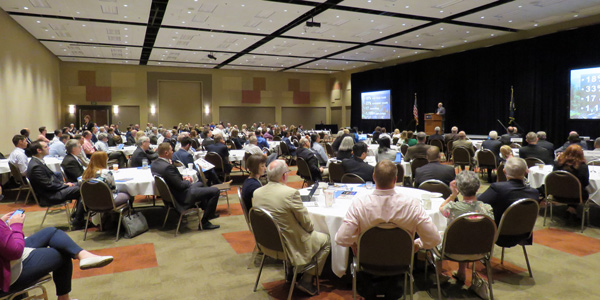By Jason Fordney
BOISE, Idaho — Two top federal energy regulators told state utility commissioners that they will take a light-handed approach as the West develops new market structures, allowing flexibility and acknowledging regional differences.
Long-time FERC Commissioner Cheryl LaFleur, and Richard Glick, who joined the commission in November, made their remarks to state regulators and industry representatives at National Association of Regulatory Utility Commissioners’ Western Conference of Public Service Commissioners (WCPSC).
LaFleur on Monday noted that dramatic shifts have taken place in the West just this year, with membership changes at Mountain West Transmission Group and competing market proposals from CAISO and Peak Reliability/Multiple Entities, Markets Now Beckon in West.)
“I think the West is the biggest story of 2018, just because of the level of interest and the number of changes,” LaFleur said. She told Idaho Public Utilities Commission President Paul Kjellander that she is “trying to send positive vibes out to the West” and “a warm current of support.”
She acknowledged that when it comes to federal oversight of the West, the California energy crisis and opposition to FERC’s Standard Market Design are still on people’s minds. There are also concerns among Western states about increased regulation by FERC during the administration of President Trump.
“Anything that happens cannot be driven from Washington, D.C., because we tried that, and it really failed,” she said, adding that “we are trying to not make it a FERC thing — it doesn’t really matter what we want.”
She said the West “seems to be in a very dynamic place right now.” The commission’s default answer on Western market integration proposals should be “yes, you can do things differently, unless there is something that is going to be wrong for customers and not just and reasonable.”
Appointed in 2010, LaFleur has worked alongside 11 commissioners and is a former chairman and acting chair. Kjellander asked what lessons LaFleur had learned during her time, which last year included a stint as the sole commissioner.
“I definitely have had a very unusual run,” LaFleur said. “It’s really been a magical mystery tour.
“One my little aphorisms is that life is a movie, not a snapshot,” she added. “Things change.”
She acknowledged changing political headwinds in the transition from President Barack Obama to Trump. “I really wanted to stay through and come out the other side and be happy, and I have,” she said. “I love the work.”
She said that the current FERC membership is still finding its center as a body.
FERC’s newest challenge is Trump’s June 1 directive to Energy Secretary Rick Perry to prevent further nuclear and coal plant retirements. The announcement was a major topic among attendees at the conference. LaFleur in comments to RTO Insider indicated a wait-and-see approach on the directive. (See More Questions than Answers for FERC, RTOs on Bailout.)
Glick Discusses Regionalization, Tx Incentives
Glick told the conference that when it comes to FERC’s regulation of the West, “more of a hands-off approach is best.”
He took to the stage on Tuesday under emergency lighting, with no microphone or sound system as a local substation problem had the Boise Centre operating with backup generators.
“Obviously, if we just had more coal and nuclear plants, this wouldn’t be happening,” Glick joked as he opened his speech, drawing laughter from the state officials in the audience. Power was restored during his comments.
Glick noted that when he was at the Department of Energy, he spent a year and a half working “almost exclusively” on the Western Energy Crisis, which he called “an interesting learning experience.” He also worked for PacifiCorp, Iberdrola (now Avangrid Renewables) and for Sen. Maria Cantwell (D-Wash.) as counsel to the Senate Energy and Natural Resources Committee.
“We are in an incredibly interesting time in the energy industry right now,” Glick said. There have been benefits to the rapid change, he said, including more choices for consumers, lower costs and cleaner energy resources.
“That doesn’t mean there aren’t some challenges,” he said, mentioning integrating renewables and the “duck curve” in California, communities being affected by coal and nuclear plant closures, and difficult issues around Western market regionalization.
He noted that benefits of the Western Energy Imbalance Market are multiplying, the market is growing and “it seems to be working very well.” But he added that “I am very aware of the politics vis-a-vis FERC and the Western states,” mentioning hostility toward Standard Market Design, and lingering mistrust between California and other Western states. Glick said his approach at FERC will be to support regionalization, but “we need to be as deferential as possible.”
“If we push the envelope, given the history of FERC and the West, that might not necessarily work out the best for anybody,” he said.
Glick also reiterated his call for FERC to review its policy on transmission incentives. “I’m not sure we are really incenting the right thing,” he said, noting that FERC routinely grants return on equity bonuses for participation in an RTO or ISO.
“I think the argument is they would be in an RTO or ISO anyhow.” He said FERC should be encouraging “right-size” transmission and using existing transmission more efficiently.







